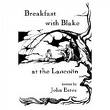
I opened it, and went to the second poem, one entitled “Prayer in the Study of Art.” It includes these lines:
In your writing of icons,
Where you in theory
No longer exist; in the face,
The image becomes a likeness
And color and shape graft
Us to forms worth following.
I bought the book. After reading it (twice), I’m glad I bought the book. He also has another short collection entitled Swerve, and a full-length collection entitled Kingdom Come that will be published in 2010.
Estes’ poems evoke a sense of the literary and a sense of everyday reality. He ranges from Virgil to a one-armed, drunken grandfather, from the art of Brueghel to a divorced man at a family barbeque. My favorite in this collection is the poem entitled “The last rites of Pavel Florensky, ” a narrative of the death of the Russian theologian, inventor, philosopher and engineer in the Soviet Gulag in 1937.
Maybe while developing
some intercepted samizdat,
hovered around as purple
vapors betrayed him –
self-evident to his enemies
even in ink, ink cloaked
by an invisible hand –
the troika damned him
for those relatively obscure
sentences on the physics
of the kingdom of God,
or for positing an icon
recalls eternity where a poem
recalls times or worse –
for proving it with numbers.
Legend says that Florensky was condemned for refusing to disclose the hiding place of the head of St. Sergii Radonezhsky. No proof for that, of course, but it makes a good story. And a truly fine poem.
In his artist’s statement in Tusculum Review, Estes said this:
“What if Americans read more poetry? We might be less deceived, might treat ourselves and others with more kindness. Except for frauds and hucksters, who we’d more easily identify, and ridicule. The holy fool would again achieve social status.”
“The holy fool would again achieve social status.” I like that.
Photo by Sonia Joie. Post by Glynn Young.
Browse more:
Poems on Writing
Poetry Reviews
Poets and Poems
- Poets and Poems: Beth Copeland and “I Ask the Mountain to Heal My Heart” - July 10, 2025
- A.E. Stallings: the Parthenon Marbles, Poets, and Artists - July 8, 2025
- Poets and Fables: Steven Flint and “The Sun and the Boy” - July 3, 2025
nAncY says
it’s nice
to get these treats
these juicy, chewy bits
of your reading
Maureen Doallas says
Estes is a wonderful poet. His is a fierce intelligence at work. Plus, he just makes such lovely lines.
Thank you.
L.L. Barkat says
I’m always up for a new good poet read. Going to find it now (or try).
Love your discussion here!
Linda Reid says
Don’t carecforvhis poetry that much.